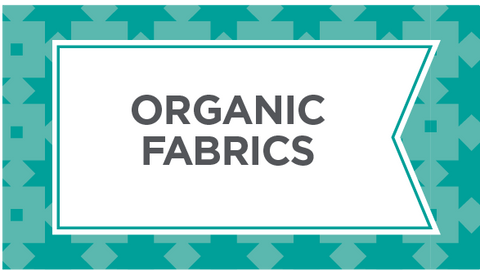Organic Fabric

Organic Cotton Fabric
Quilting with organic fabrics that are free of toxins is a rewarding experience, especially when making items for people with sensitive skin. These beautiful organic cotton fabrics are GOTS and/or OEKO-TEX certified for quality assurance. Shop our selection of organic fabric by the yard to find the finest fibers for every stitch.
Organic Fabric
We will make a bet that you have seen the label organic while you’ve been out shopping. Certainly you have seen organic apples, cucumbers, and eggs. How about organic cotton t-shirts and organic fabric? Organic products are popping up everywhere. But maybe you’re wondering what organic means. What is organic cotton fabric? What does that GOTS label mean? And what the heck is OEKO-TEX fabric?
We are going to stay in our lane; we are not going to tackle organic food. But, we will try to clear up some confusion about organic cotton fabric.
The gold standard for certified organic fabric is GOTS. GOTS is an acronym that stands for Global Organic Textile Standard. Anywhere along the supply chain a cotton grower, a textile manufacturer, a fabric printer, or a distributor could claim that they are selling organic cotton fabric. But how could you be sure that statement was true? GOTS!
To earn a GOTS label, 95% of the fibers in a fabric must have been grown without the use of synthetic pesticides or herbicides and the cotton itself cannot be genetically modified. But GOTS doesn’t stop there. GOTS rules are designed to reduce environmental harms of the textile industry and guard against the exploitation of workers. Before it becomes GOTS certified organic cotton fabric, inspectors check during every step of the supply chain to make sure stringent rules are followed. Think about how important this is. What would be the benefit of organic cotton fabric, if it were dyed or printed with chemicals toxic to the environment and harmful to either the workers manufacturing the cloth or the people who will wear it?
Okay. GOTS sounds good. What is that other label–OEKO-TEX certified fabric? If you see an OEKO-TEX Standard 100 label on a fabric, it means that the experts at OEKO-TEX have submitted it to rigorous testing and have determined that it does not contain substances harmful to human health. If you see the label on a garment or bedding, every component of the item has been tested–the fibers of the cloth, the threads used to sew it, zippers and rivets, interfacing, batting–everything.
When you ask, OEKO-TEX vs GOTS–which is better? The answer is that they both try to keep consumers safe and eliminate harmful chemicals from our home environments. Unlike GOTS, OEKO-TEX is not solely focused on organic fibers. And OEKO-TEX does not strive to ensure the ethical treatment of the workers who produce the products it tests, although their lives may be improved by working with safer materials.
We have discussed how GOTS certification can help you be sure you are getting the real deal when you buy organic fabric. And OEKO-TEX certification can give you assurance that your fabric is free of toxins. But we haven’t answered the question, is organic cotton so much better than non-organic that it is worth the additional cost?
Proponents of organic farming feel that it is better to avoid using synthetic pesticides, herbicides, and fertilizers that have unintended consequences on our environment. One problem with using pesticides is that you often kill the bugs you do want when you kill the bugs you don’t want. And every bug is breakfast for some bird! Another concern is the harmful effects these chemicals have when they leach into the water system. In addition, the chemicals that we spray on crops like cotton can stay in the fibers, potentially creating an irritant for people who process the fibers and who eventually wear it.
There is a downside to organic cotton. If you grow an acre of organic cotton and an acre of non-organic cotton, you will harvest less cotton from your organic field. And you will probably put more water on it to help it grow. So, if–worldwide–we deforest more land to grow more organic cotton and use more water to do it, would that be better? Also, keep in mind that even organic farmers use natural pesticides, herbicides, and fertilizers. These also can be polluting, toxic, and irritating to humans and the environment.
Some people have extremely sensitive skin or allergies to synthetic fibers, non-natural dyes, or the residual pesticides and herbicides that sometimes remain in non-organic cotton. Can you imagine wearing clothes that make your skin hurt? For these folks, clothes made from organic fabric are essential.
So, have we cleared up some questions? We hope so! We want our Missouri Star customers to be well-informed and love the things you buy from us. If you decide that you want organic fabric for a project, please know that we have curated a selection of GOTS certified organic cotton fabric by the yard. You will also find many choices of OEKO-TEX fabric by the yard. And check back often! As organic fabrics grow in both popularity and availability, our selection will change to meet the needs of our customers.